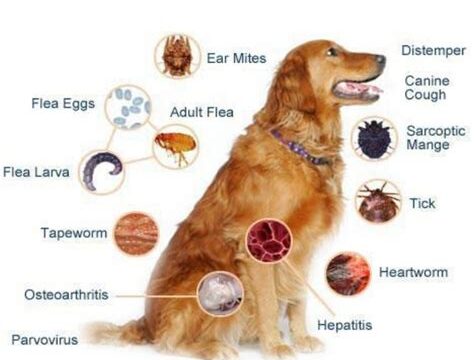Help keep your furry friend healthy and happy with regular exercise, balanced diet, vet check-ups, grooming, parasite prevention, mental stimulation, and early symptom recognition. Learn more.
Regular Exercise for Dogs
Dogs, just like humans, require regular exercise to maintain their physical and mental well-being. Without enough physical activity, dogs can develop a range of health issues, including obesity, heart disease, and behavioral problems. It’s important to prioritize regular exercise for your furry friend to keep them healthy and happy.
When it comes to exercise for dogs, the key is to find activities that your pup enjoys and that also provide them with a good workout. Daily walks are a great way to keep your dog active, and they also provide an opportunity for mental stimulation and socialization. Playing fetch, running, hiking, and swimming are also excellent ways to get your dog moving and burning off excess energy.
Remember to consider your dog’s age, breed, and overall health when planning their exercise routine. Puppies and young dogs may have different exercise needs than senior dogs, and certain breeds may require more vigorous exercise than others. Always consult with your veterinarian to ensure that you’re providing the right amount and type of exercise for your dog.
Balanced Diet for Canine Health
Ensuring that your dog has a balanced diet is crucial for maintaining their overall health and preventing common illnesses. Just like humans, dogs require a variety of nutrients to thrive, including protein, fats, carbohydrates, vitamins, and minerals. A diet that lacks in any of these essential nutrients can lead to a weakened immune system, poor growth, and a higher risk of diseases.
When planning your dog’s meals, it’s important to consider their age, breed, size, and activity level. Puppies, for example, require a diet that is higher in calories and nutrients to support their rapid growth and development, while senior dogs may benefit from a diet that is lower in calories and contains joint-supporting nutrients to aid in mobility. Additionally, different breeds may have specific dietary needs, such as large breeds requiring diets that support healthy bone growth.
Commercial dog foods are often formulated to meet the nutritional needs of dogs, but it’s important to carefully read the labels and choose high-quality, nutrient-rich options. Look for foods that list real meats or high-quality protein sources as the first ingredient, as well as include a good balance of fats and carbohydrates. Additionally, consulting with your veterinarian can help ensure that your dog is receiving the proper nutrition for their specific needs.
Importance of Regular Vet Check-ups
Regular vet check-ups are essential for ensuring the overall health and well-being of your beloved canine companion. Just like humans, dogs require routine medical examinations to detect any potential health issues early on, before they develop into more serious conditions. By scheduling regular check-ups with a qualified veterinarian, you can proactively monitor your dog’s physical health, address any underlying concerns, and receive professional guidance on preventive care measures.
During these vet visits, your dog will undergo a thorough physical examination, including a check of their weight, heart rate, and temperature. The vet will also assess your dog’s eyes, ears, teeth, and coat, looking for any signs of infection, injury, or abnormal growths. Additionally, they may recommend necessary vaccinations, parasite prevention treatments, and routine blood or urine tests to ensure your dog’s internal health is in good condition.
Furthermore, regular vet check-ups provide an opportunity for you to discuss any behavioral or dietary concerns with the veterinarian, as well as receive guidance on appropriate exercise routines and mental stimulation activities for your dog. By investing in regular veterinary care, you can help prevent common illnesses and ensure that your canine companion enjoys a long, healthy, and happy life by your side.
Grooming and Hygiene Practices
Proper grooming and hygiene practices are essential for maintaining the health and well-being of your canine companion. Keeping your dog clean and well-groomed helps prevent a wide range of common illnesses and skin conditions. Regular grooming not only keeps your dog looking and feeling their best, but it also allows you to check for any unusual lumps, bumps, or skin issues that may need attention.
Start by giving your dog regular baths using a mild, dog-friendly shampoo. Be sure to thoroughly dry your dog afterwards to prevent moisture from leading to skin infections. In addition to regular baths, it’s important to also trim your dog’s nails, clean their ears, and brush their teeth. Keeping your dog’s nails trimmed prevents them from becoming overgrown and causing discomfort, while cleaning their ears and brushing their teeth helps prevent ear infections and dental issues.
Regular grooming not only helps maintain your dog’s physical health, but it also provides an opportunity for bonding and building trust with your canine companion. By establishing a regular grooming routine, you can help your dog become more comfortable with being handled and touched, making vet visits and other necessary care much easier. Ultimately, proper grooming and hygiene practices are key to keeping your dog healthy and happy for years to come.
Preventing Parasitic Infections
Keeping your dog healthy and free from parasitic infections is a crucial part of responsible pet ownership. Parasites such as fleas, ticks, and worms can cause serious harm to your furry friend, so it’s important to take preventive measures to minimize the risk.
One of the most effective ways to prevent parasitic infections is by using preventative medications recommended by your veterinarian. These medications can provide long-lasting protection against fleas, ticks, and heartworms, reducing the likelihood of infestation and infection.
In addition to using preventative medications, it’s important to maintain a clean environment for your dog. Regularly vacuuming and cleaning your home, as well as preventing your dog from coming into contact with potentially contaminated areas, can help minimize the risk of parasitic infestations.
Mental Stimulation for Dogs’ Well-being
It is important for the overall well-being of dogs to engage in activities that provide mental stimulation. Dogs are intelligent animals and need to be mentally challenged in order to prevent boredom and behavioral issues. One way to provide mental stimulation for your dog is by incorporating puzzle toys and interactive games into their daily routine. These toys and games require the dog to use their problem-solving skills, keeping their minds sharp and active.
Another way to promote mental stimulation is through regular training sessions. Training not only helps to teach your dog new skills, but it also provides mental exercise as they learn to follow commands and perform tasks. Training sessions also strengthen the bond between you and your dog, providing them with the mental stimulation they need while also fostering a strong relationship.
Additionally, taking your dog on different routes during walks can provide mental stimulation by allowing them to experience new sights, sounds, and smells. Dogs thrive on exploration and new experiences, so varying their walking routes can keep them engaged and mentally stimulated.
Recognizing and Addressing Early Symptoms
As responsible pet owners, it is our duty to recognize and address early symptoms of illness in our beloved dogs. One common early symptom to look out for is changes in behavior. If your normally energetic and playful dog suddenly becomes lethargic and uninterested in activities, it could be a sign that something is wrong.
Another important early symptom to be aware of is changes in eating habits. Loss of appetite or sudden weight loss can be indicative of underlying health issues. Keep an eye on your dog’s food and water intake to ensure they are maintaining a healthy diet.
Additionally, paying attention to changes in bodily functions such as excessive urination, diarrhea, or vomiting can also help in identifying early signs of illness. If you notice any of these symptoms, it is crucial to seek veterinary care promptly to prevent potential health complications.
Frequently Asked Questions
What are some common health issues in dogs?
Common health issues in dogs include obesity, dental problems, arthritis, and infections.
How can I maintain my dog’s dental health?
You can maintain your dog’s dental health by regular tooth brushing, providing dental chews, and scheduling regular dental check-ups with the vet.
What are some tips for preventing obesity in dogs?
To prevent obesity in dogs, provide regular exercise, feed a balanced diet in appropriate portions, and avoid too many treats.
How often should I take my dog to the vet for check-ups?
It is recommended to take your dog to the vet for a check-up at least once a year, but more frequent check-ups may be necessary for senior dogs or those with health issues.
What vaccinations does my dog need to stay healthy?
Your dog should receive core vaccinations such as rabies, distemper, parvovirus, and hepatitis, as well as any additional vaccinations recommended by your vet based on your location and your dog’s lifestyle.
How can I prevent my dog from getting heartworm?
To prevent heartworm, use a monthly heartworm preventive medication, avoid areas with standing water where mosquitoes breed, and have your dog tested for heartworm annually.
What are some signs that my dog may be sick and need to see a vet?
Signs that your dog may be sick and need to see a vet include changes in appetite, energy level, or behavior, vomiting, diarrhea, coughing, and difficulty breathing.





